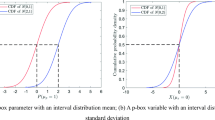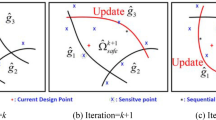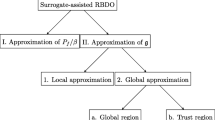Abstract
Reliability-based design optimization (RBDO) is often associated with computationally expensive computer simulations in practical engineering applications, in which both objective and constraint functions may be implicit and time-consuming to evaluate. To improve the efficiency of RBDO, metamodels are often employed to substitute the implicit and expensive functions. In this paper, a new local update-based method is proposed for RBDO under the approximation of both objective and constraint functions. In this method, Kriging metamodels are employed to replace both objective and constraint functions, and sequential optimization and reliability assessment (SORA) is adopted to perform RBDO. Meanwhile, a local update method is developed for the approximation of objective and constraint functions, termed as LUOC. In LUOC, two local update strategies are proposed. For the constraint functions, one local update strategy judges the active constraints and then sequentially refines their Kriging metamodels in the local regions around the most probable target points obtained by SORA. For the objective function, the other local update strategy based on expected improvement is developed to refine the Kriging metamodel in the local region around the SORA solution with considering the Kriging prediction variance. Three examples including a battery design application are presented to test the accuracy and efficiency of the proposed method for RBDO.








Similar content being viewed by others
References
Du X, Chen W (2004) Sequential optimization and reliability assessment method for efficient probabilistic design. J Mech Des 126:225–233. https://doi.org/10.1115/1.1649968
Lee I, Choi KK, Du L, Gorsich D (2008) Inverse analysis method using MPP-based dimension reduction for reliability-based design optimization of nonlinear and multi-dimensional systems. Comput Methods Appl Mech Eng 198:14–27. https://doi.org/10.1016/j.cma.2008.03.004
Hu Z, Du X (2015) First order reliability method for time-variant problems using series expansions. Struct Multidiscip Optim 51:1–21. https://doi.org/10.1007/s00158-014-1132-9
Zhang J, Xiao M, Gao L et al (2018) An improved two-stage framework of evidence-based design optimization. Struct Multidiscip Optim 58:1673–1693. https://doi.org/10.1007/s00158-018-1991-6
Meng Z, Zhang D, Liu Z, Li G (2018) An adaptive directional boundary sampling method for efficient reliability-based design optimization. J Mech Des 140:121406. https://doi.org/10.1115/1.4040883
Arenbeck H, Missoum S, Basudhar A, Nikravesh P (2010) Reliability-based optimal design and tolerancing for multibody systems using explicit design space decomposition. J Mech Des 132:021010. https://doi.org/10.1115/1.4000760
Huang Y-C, Chan K-Y (2010) A modified efficient global optimization algorithm for maximal reliability in a probabilistic constrained space. J Mech Des 132:061002. https://doi.org/10.1115/1.4001532
Zhao L, Choi KK, Lee I, Gorsich D (2013) Conservative surrogate model using weighted Kriging variance for sampling-based RBDO. J Mech Des 135:091003. https://doi.org/10.1115/1.4024731
Wang Z, Wang P (2013) A maximum confidence enhancement based sequential sampling scheme for simulation-based design. J Mech Des 136:021006. https://doi.org/10.1115/1.4026033
Zhang J, Xiao M, Gao L, Fu J (2018) A novel projection outline based active learning method and its combination with Kriging metamodel for hybrid reliability analysis with random and interval variables. Comput Methods Appl Mech Eng 341:32–52. https://doi.org/10.1016/j.cma.2018.06.032
Echard B, Gayton N, Lemaire M (2011) AK-MCS: an active learning reliability method combining Kriging and Monte Carlo Simulation. Struct Saf 33:145–154. https://doi.org/10.1016/j.strusafe.2011.01.002
Xiao M, Zhang J, Gao L et al (2019) An efficient Kriging-based subset simulation method for hybrid reliability analysis under random and interval variables with small failure probability. Struct Multidiscip Optim 59:2077–2092. https://doi.org/10.1007/s00158-018-2176-z
Zhang J, Xiao M, Gao L (2019) An active learning reliability method combining Kriging constructed with exploration and exploitation of failure region and subset simulation. Reliab Eng Syst Saf 188:90–102. https://doi.org/10.1016/j.ress.2019.03.002
Xiao N-C, Yuan K, Zhou C (2020) Adaptive kriging-based efficient reliability method for structural systems with multiple failure modes and mixed variables. Comput Methods Appl Mech Eng 359:112649. https://doi.org/10.1016/J.CMA.2019.112649
Shi Y, Lu Z, He R et al (2020) A novel learning function based on Kriging for reliability analysis. Reliab Eng Syst Saf 198:106857
Xiao NC, Zuo MJ, Zhou C (2018) A new adaptive sequential sampling method to construct surrogate models for efficient reliability analysis. Reliab Eng Syst Saf 169:330–338. https://doi.org/10.1016/j.ress.2017.09.008
Lelièvre N, Beaurepaire P, Mattrand C, Gayton N (2018) AK-MCSi: a Kriging-based method to deal with small failure probabilities and time-consuming models. Struct Saf 73:1–11. https://doi.org/10.1016/j.strusafe.2018.01.002
Yang ZY, Cao ZJ, Feng XB et al (2017) Robustness of subset simulation to functional forms of limit state functions in system reliability analysis: revisiting and improvement. IEEE Trans Reliab 67:66–78
Lee J-O, Yang Y-S, Ruy W-S (2002) A comparative study on reliability-index and target-performance-based probabilistic structural design optimization. Comput Struct 80:257–269. https://doi.org/10.1016/S0045-7949(02)00006-8
Ting Lin P, Chang Gea H, Jaluria Y (2011) A modified reliability index approach for reliability-based design optimization. J Mech Des 133:044501
Tu J, Choi KK, Park YH (1999) A new study on reliability-based design optimization. J Mech Des 121:557. https://doi.org/10.1115/1.2829499
Youn BD, Choi KK, Du L (2008) Enriched performance measure approach for reliability-based design optimization. AIAA J 43:874–884. https://doi.org/10.2514/1.6648
Keshtegar B, Hao P (2018) A hybrid descent mean value for accurate and efficient performance measure approach of reliability-based design optimization. Comput Methods Appl Mech Eng 336:237–259. https://doi.org/10.1016/j.cma.2018.03.006
Keshtegar B, Hao P (2018) Enriched self-adjusted performance measure approach for reliability-based design optimization of complex engineering problems. Appl Math Model 57:37–51. https://doi.org/10.1016/j.apm.2017.12.030
Zhu S-P, Keshtegar B, Trung N-T et al (2019) Reliability-based structural design optimization: hybridized conjugate mean value approach. Eng Comput. https://doi.org/10.1007/s00366-019-00829-7
Keshtegar B, Meng D, Ben Seghier MEA et al (2020) A hybrid sufficient performance measure approach to improve robustness and efficiency of reliability-based design optimization. Eng Comput. https://doi.org/10.1007/s00366-019-00907-w
Yaseen ZM, Keshtegar B (2019) Limited descent-based mean value method for inverse reliability analysis. Eng Comput 35:1237–1249. https://doi.org/10.1007/s00366-018-0661-z
Youn BD, Choi KK, Du L (2005) Adaptive probability analysis using an enhanced hybrid mean value method. Struct Multidiscip Optim 29:134–148. https://doi.org/10.1007/s00158-004-0452-6
Lee I, Choi KK, Du L, Gorsich D (2008) Dimension reduction method for reliability-based robust design optimization. Comput Struct 86:1550–1562. https://doi.org/10.1016/j.compstruc.2007.05.020
Liang J, Mourelatos ZP, Nikolaidis E (2007) A single-loop approach for system reliability-based design optimization. J Mech Des 129:1215–1224
Keshtegar B, Hao P (2018) Enhanced single-loop method for efficient reliability-based design optimization with complex constraints. Struct Multidiscip Optim 57:1731–1747
Meng Z, Keshtegar B (2019) Adaptive conjugate single-loop method for efficient reliability-based design and topology optimization. Comput Methods Appl Mech Eng 344:95–119
Huang H, Zhang X, Liu Y et al (2012) Enhanced sequential optimization and reliability assessment for reliability-based design optimization. J Mech Sci Technol 26:2039–2043. https://doi.org/10.1007/s12206-012-0511-7
Youn BD, Choi KK (2004) An investigation of nonlinearity of reliability-based design optimization approaches. J Mech Des 126:403. https://doi.org/10.1115/1.1701880
Papadrakakis M, Lagaros ND (2002) Reliability-based structural optimization using neural networks and Monte Carlo simulation. Comput Methods Appl Mech Eng 191:3491–3507. https://doi.org/10.1016/S0045-7825(02)00287-6
Basudhar A, Missoum S (2008) Adaptive explicit decision functions for probabilistic design and optimization using support vector machines. Comput Struct 86:1904–1917. https://doi.org/10.1016/j.compstruc.2008.02.008
Lee TH, Jung JJ (2008) A sampling technique enhancing accuracy and efficiency of metamodel-based RBDO: constraint boundary sampling. Comput Struct 86:1463–1476. https://doi.org/10.1016/j.compstruc.2007.05.023
Zhuang X, Pan R (2012) A sequential sampling strategy to improve reliability-based design optimization with implicit constraint functions. J Mech Des 134:21002
Zhang Y, Gao L, Xiao M (2020) Maximizing natural frequencies of inhomogeneous cellular structures by Kriging-assisted multiscale topology optimization. Comput Struct 230:106197
Xiao M, Zhang J, Gao L (2020) A system active learning Kriging method for system reliability-based design optimization with a multiple response model. Reliab Eng Syst Saf. https://doi.org/10.1016/j.ress.2020.106935
Zhang Y, Xiao M, Gao L et al (2020) Multiscale topology optimization for minimizing frequency responses of cellular composites with connectable graded microstructures. Mech Syst Signal Process 135:106369. https://doi.org/10.1016/J.YMSSP.2019.106369
Zhang Y, Xiao M, Zhang X, Gao L (2020) Topological design of sandwich structures with graded cellular cores by multiscale optimization. Comput Methods Appl Mech Eng 361:112749. https://doi.org/10.1016/J.CMA.2019.112749
Zhang J, Xiao M, Gao L, Chu S (2019) A combined projection-outline-based active learning Kriging and adaptive importance sampling method for hybrid reliability analysis with small failure probabilities. Comput Methods Appl Mech Eng 344:13–33. https://doi.org/10.1016/j.cma.2018.10.003
Qian J, Yi J, Cheng Y et al (2019) A sequential constraints updating approach for Kriging surrogate model-assisted engineering optimization design problem. Eng Comput. https://doi.org/10.1007/s00366-019-00745-w
Chen Z, Qiu H, Gao L et al (2014) A local adaptive sampling method for reliability-based design optimization using Kriging model. Struct Multidiscip Optim 49:401–416. https://doi.org/10.1007/s00158-013-0988-4
Chen Z, Peng S, Li X et al (2015) An important boundary sampling method for reliability-based design optimization using Kriging model. Struct Multidiscip Optim 52:55–70. https://doi.org/10.1007/s00158-014-1173-0
Li X, Qiu H, Chen Z et al (2016) A local Kriging approximation method using MPP for reliability-based design optimization. Comput Struct 162:102–115. https://doi.org/10.1016/j.compstruc.2015.09.004
Jones DR, Schonlau M, Welch WJ (1998) Efficient global optimization of expensive black-box functions. J Glob Optim 13:455–492. https://doi.org/10.1023/A:1008306431147
Rosenblatt M (2007) Remarks on a multivariate transformation. Ann Math Stat 23:470–472. https://doi.org/10.1214/aoms/1177729394
Liu PL, Der Kiureghian A (1986) Multivariate distribution models with prescribed marginals and covariances. Probab Eng Mech 1:105–112. https://doi.org/10.1016/0266-8920(86)90033-0
Zhang D, Han X, Jiang C et al (2017) Time-dependent reliability analysis through response surface method. J Mech Des 139:41404
Chen Z, Qiu H, Gao L et al (2013) An adaptive decoupling approach for reliability-based design optimization. Comput Struct 117:58–66. https://doi.org/10.1016/j.compstruc.2012.12.001
Li W, Peng X, Xiao M et al (2019) Multi-objective design optimization for mini-channel cooling battery thermal management system in an electric vehicle. Int J Energy Res 43:3668–3680
Acknowledgements
This research was supported by the National Natural Science Foundation of China (Grant Nos. 51675196 and 51721092), the Natural Science Foundation of Hubei Province (Grant No. 2019CFA059), the Program for HUST Academic Frontier Youth Team (Grant No. 2017QYTD04).
Author information
Authors and Affiliations
Corresponding author
Additional information
Publisher's Note
Springer Nature remains neutral with regard to jurisdictional claims in published maps and institutional affiliations.
Rights and permissions
About this article
Cite this article
Zhang, J., Xiao, M. & Gao, L. A new local update-based method for reliability-based design optimization. Engineering with Computers 37, 3591–3603 (2021). https://doi.org/10.1007/s00366-020-01019-6
Received:
Accepted:
Published:
Issue Date:
DOI: https://doi.org/10.1007/s00366-020-01019-6




